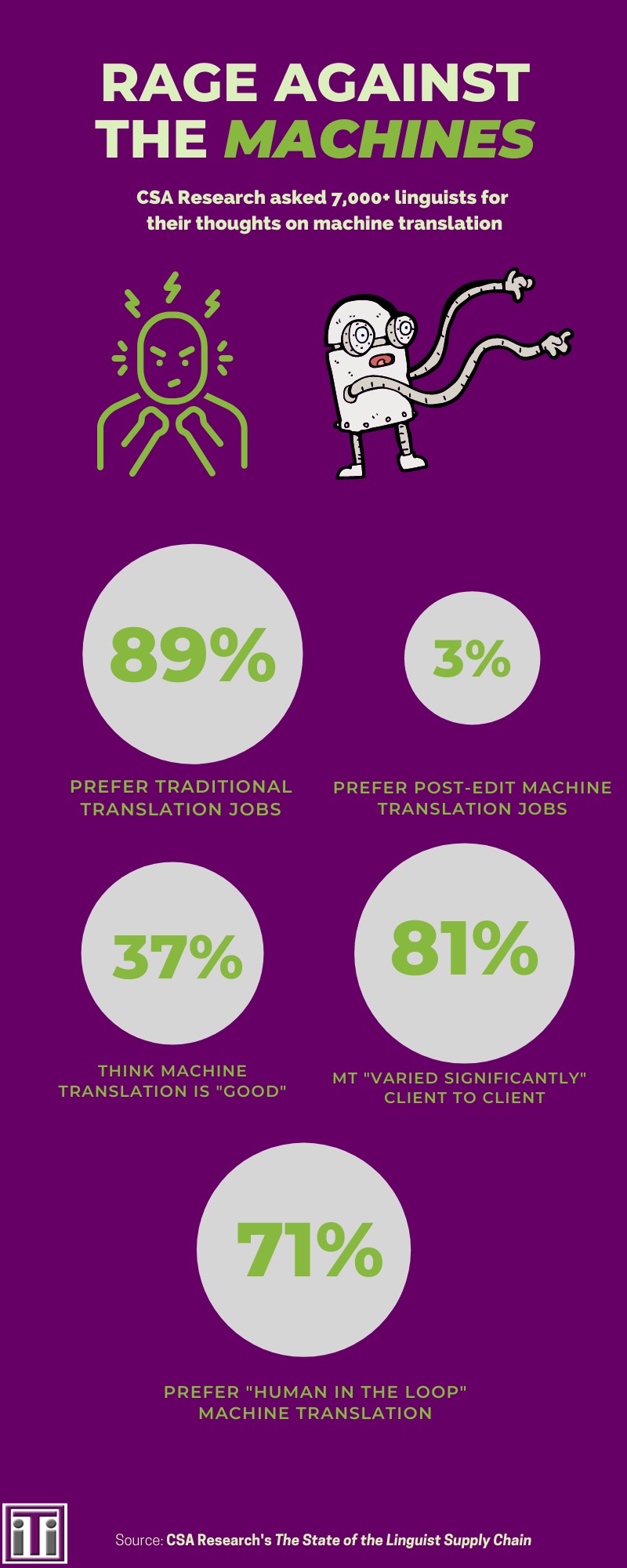
We have all seen the Google Translate fails. They are often innocent and good for a chuckle. However, in the grand scheme of things, machine translation has improved drastically and is pretty useful depending on the context. With the rise of ChatGPT and other more sophisticated tools, one question is asked more often: Will AI replace human translators?
Some might find that question silly, but consider this: Memsource CEO David Čaněk said during SlatorCon (an event hosted by language-industry leading authority Slator) that 2020 marked the first year Post-Edit Machine Translation (PEMT) was the dominant method of translation.
That development and the advancements of machine translation is why people are wondering if AI will replace human translators.
We covered this topic a few years ago but, in short, the answer remains the same. No, AI will never replace human translators because machines are unable to capture the nuance that comes from each language’s different grammatical rules, semantics, syntax and cultural influence.
Thus, the future of translation is that humans and AI will continue to work together (PEMT) because the human element can never be fully replaced.
AI Translation Sources in 2023
In recent years, AI translation sources have made significant progress. ChatGPT, a large language model trained by OpenAI, based on the GPT-3.5 architecture, is one such example. ChatGPT has the ability to translate between languages and communicate with people in a way that feels more natural than earlier tools.
Another example is the Google Neural Machine Translation (GNMT) system, which uses neural networks to produce translations.
Why Human Translation is (still) Better than Machine
While AI translation sources have made significant strides, there are still several factors that make human translators essential. Machine translation is great for simple, straightforward texts, but when it comes to more complex texts or content that requires cultural nuance, human translation is still necessary.
There are more than 7,000 languages, according to Ethnologue, and each has its own quirks. Every culture has its own sayings that only make sense with context.
When you think about it in those terms, it is easy to see why human translators are still in high demand. The U.S. Bureau of Labor Statistics reports employment of interpreters and translators is expected to grow by 20 percent from now until 2029.
In business, specifically in healthcare, bad translations can have serious consequences. Take this example: The Virginia Pilot pointed out that the state’s COVID site was using a machine translation tool to help with vaccination scheduling.
The issue? The machine translation mistook the word “book” (“to reserve in advance” per Merriam-Webster) and replaced it with the Spanish word for a leather-bound piece of literature. You can see why that mistake would cause mass confusion.
Another error based on Virginia’s use of machine translation: “The vaccine is not required,” was mistranslated to “The vaccine is not necessary” in Spanish. These mistakes can have major repercussions when they occur during a public health crisis.

Google rolled out Google Translate in 2006. Ten years later, the tech giant introduced Neural Machine Translation, which reduced Google Translate errors by 60%, according to a Cornell University study.
Even more mind-boggling is the mistakes were made translating Spanish, which is the second-most spoken language in the U.S. and the fourth-most spoken language in the world, according to Ethnologue.
If machine translation can’t get Spanish right, how confident can we be of its accuracy with less-common languages?
The vaccine booking example above highlights the biggest shortcoming of machines, which is that they are very literal in their translations. Human translators, unlike machines, can determine the correct way to use a word based on context.
Human translators also understand that certain words can be spelled the same way and mean different things. These types of words are called homophones and they often trick machines who lack critical thinking skills.
For instance, the word “lead” could mean to guide someone, or it could refer to the toxic metal, or it could mean the first sentence of a story, or it could mean the top story on the local news.
That is one example in English, one of the most complex languages in the world. Imagine how many there are in other languages.
Then there are untranslatable words, which raises the point that rare languages often give AI translation tools major issues. Rare languages even give human translators issues, but they have the ingenuity to solve them.
Wired recently detailed an example of a non-profit group creating a new word in a rarely-spoken language because it did not have a way to describe diabetes, which occurs when your blood has too much sugar in it. The word they created to describe it translates to “sweet blood” in English.
Human translators are also better than machines because they are capable of understanding the nuance of idioms and humor cross-culturally. Exhibit A: In English, when we want to say you are being deceived, you might say, “You are pulling the wool over my eyes.” That phrase would mean nothing to a Russian person (transcreation exists for this reason). In Russian culture, the saying is “Hanging noodles on your ears.”
Speaking of Russia, translation errors sneak into international diplomacy from time to time. In 2009, then U.S. Secretary of State Hillary Clinton gave a gift to the Russian Foreign Minister that was aimed at “resetting” relations between the long-time adversaries. Clinton’s “gift” was a mock “reset” button with what was supposed to be the Russian word for “reset,” but it actually translated to “overcharged” (electrically speaking) or “overworked.” The incident generated a few laughs, but the mistake overshadowed the intent of what Clinton was trying to accomplish.
So, while it is clear AI will never replace human translators, the genie is out of the bottle in terms of machine translation. What does that mean for the future of translation? You are about to find out.
iTi has specialized in custom language solutions for more than 30 years. We have unparalleled turnaround times and 10,000 linguists who can provide support in more than 250 languages.
How Neural Machine Translation Works
To understand why machines will never replace human translators, we first need to understand machine translation. What is machine translation?
The Globalization and Localization Association (GALA) defines machine translation as, “the process when computer software translates a text from the source language into the target language without human intervention.”

The most recent iterations of machine translation rely on AI and generate translations through neural networks, which according to IBM, are a “subset of machine learning” that is designed to “mimic” the human way our neurons send signals to one another. This method examines whole sentences instead of just words. The result is a more natural-sounding translation with well-captured meaning and more accurate sentences.
There is also this: In April of 2020, a study from researchers at the University of California, San Francisco (UCSF) found that they could translate brain signals into complete sentences with 97 percent accuracy!
The researchers point to a connection between their work and the process of Neural Machine Translation. So, are the machines coming for our jobs? They are already here, but they are more like C3PO rather than Translation Terminators.
Lost in Translation: The Potential Liability of AI Translation in Healthcare
The possible negative consequences of machine translation errors in medical situations cannot be overstated.
One AI translation produced this Armenian instruction on ibuprofen: “You can take over the counter ibuprofen as needed for pain,” became “You can take anti-tank missile as much as you need for pain.”
The pandemic has revealed a health-language gap that the World Health Organization considers an “infodemic,” and one the Centers for Disease Control and Prevention terms a “communications emergency.” The reliance solely on machine translation technology is only making this worse.
iTi’s medical translators undergo extensive training and are specifically versed in the nuance of medical terminology. There is no debate that machine translation should never see the light of day in a medical setting, yet its use persists.
Privacy and Security Concerns with Machine Translation
Some organizations have expressed concerns that the use of machine translation may result in breaches of confidentiality and security. If translation is done by an online service, then the content data is on a server somewhere. Can users be certain that competitors or others with less-than-honorable intentions won’t be able to access that information? In 2017, Norwegian broadcasting company NRK reported that documents translated on a popular website were not only stored in the cloud, but were actually accessible via a simple Google search.
The Future of Translation Technology and Humans
AI-powered machines will never replace human translators, that much is clear. What does this mean for the future of translation technology and humans? It means that companies will increasingly turn to both machines and humans to handle their translation needs as time goes on. There are two reasons: one, machine translation is cheaper, however, humans will still be needed to proofread and post-edit these translations to make them suitable for business use.
This process, which was referred to in the intro, is called Post-Edit Machine Translation (PEMT). It involves human translators using Computer-Assisted Translation (CAT) tools. The main selling point is increased production and faster turnaround times. There are drawbacks to this method, however. The main one is human translators have major issues with it.
Why? Because PEMT actually takes longer because they need to decipher the meaning behind some pretty contextually inaccurate machine translations. Translators have commented in group threads about the need to be compensated properly to deal with the extra headaches, and also said they often would rather start from scratch.
CSA Research’s 2020 “The State of the Linguist Supply Chain” survey of more than 7,000 linguists found 89% preferred traditional translation — just 3% preferred post-edit machine translation jobs. The survey showed that 37% of linguists thought the machine translation was “good” and 81% said the quality of MT “varied significantly” from client to client.
A whopping 71% prefer “human in the loop,” which is a process featuring AI that can learn from and adapt to human feedback.
Thus, the future of translation is the “human in the loop” method because it combines the best of both worlds — and it is one that human translators seem to be willing to work with. However, use of human in the loop is not prevalent, judging by the results of the CSA Research survey. Until this process improves greatly, you are better off dealing with a human from the start. As the saying goes, “Measure twice, cut once.” How would you express that sentiment in Korean? Machine translation would not be able to help with that, but we know someone who can!
If you liked this post, check out “Yes But Can AI Localize?” or contact us with the button below.
| Contact Us |
This post was originally published May 21, 2021. It has been updated to include new information.






Comments are closed here.